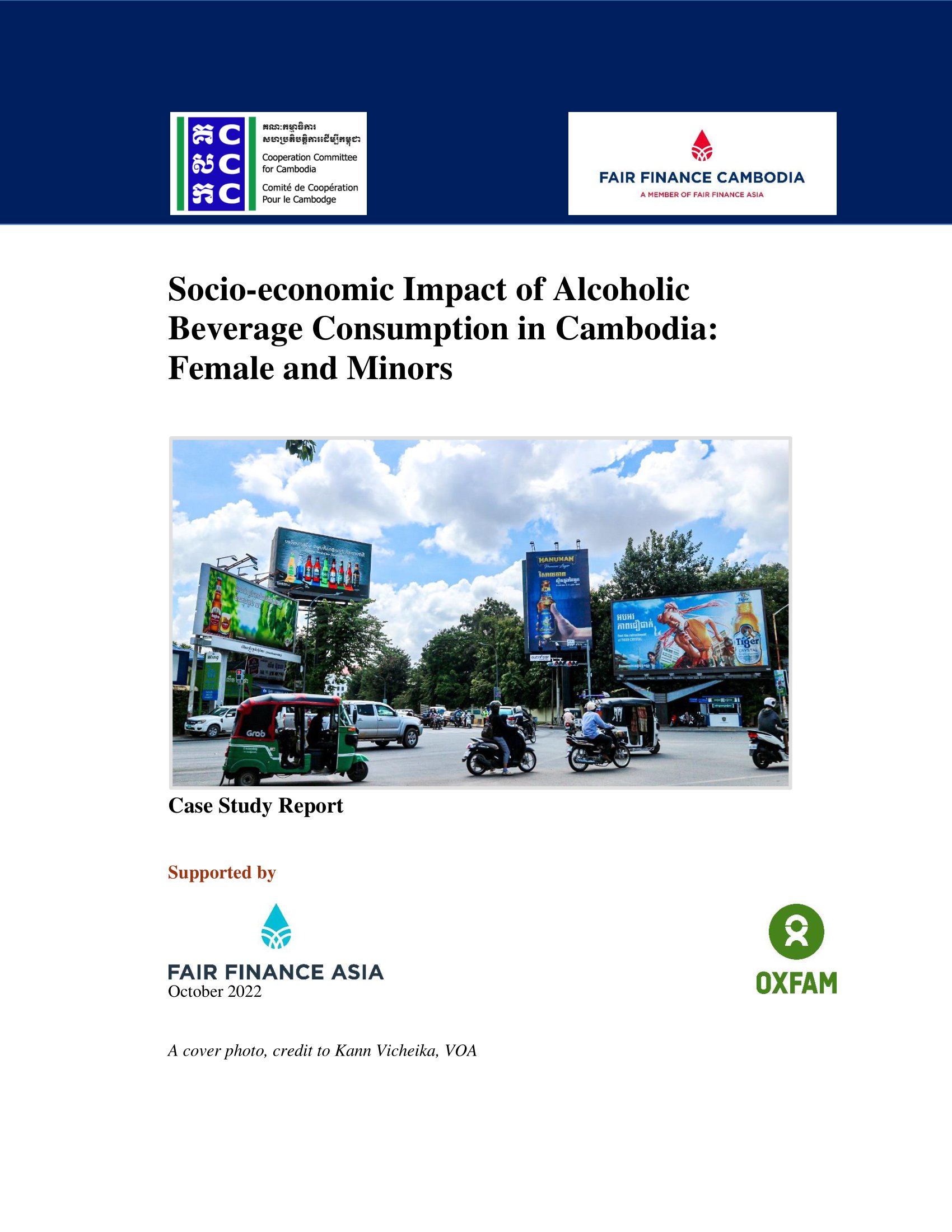
The purpose of the case study is to inform banks and banking regulators/representative bodies/partners including the NBC, ABC, alcoholic beverage production and distribution firms, the Council for Development in Cambodia, Ministry of Economy and Finance, CSOs, and academia/think tanks on the necessity for integration and implementation of ESG principles in Cambodian banks’ policies, in addition to regulations from the NBC and other related regulators, in order to minimize negative impacts and maximize positive impacts for their investment decision-making within the alcoholic beverage sector.
The study looked at the two imperative sides of the alcoholic beverage business. On the demand or consumer side, the study analysed impacts of alcoholic beverage consumption on economic and social aspects, emphasizing the under-age and women groups. On the supply side, focused on producers and sellers, the study aimed to have an in-depth understanding of the financial flows and business ethics within the alcoholic beverage business in Cambodia, focusing on production, marketing, and distribution. The study also assessed the roles of the third party who may influence the alcoholic beverage industry. Furthermore, the study aimed to assess existing policies and policy gaps concerning the integration and enforcement of the ESG principle of banks operating in Cambodia for investment decisions in the alcoholic beverage business sector. The study also explored the necessity and status of laws and regulations and their implementation relating to the alcohol industry.
In Cambodia, alcohol consumption dramatically and constantly increases. The average alcohol per capita (15+) consumption in Cambodia increased from 8.8 liters of pure alcohol in 2010 to 9.7 liters in 2015, 3.5 liters above the global average of annual alcohol consumption per capita, according to the World Health Organisation (WHO) and other reports (WHO, 2018). Cambodia has the highest level of alcohol consumption among 15- to 19-year-olds in the Association of South East Asia Nations (ASEAN) countries. The increased amount and attractive advertisement of alcoholic beverages are significant factors causing the increased drinking. The intervention to ban advertisements in Cambodia is less effective.
The alcohol beverage industry positively contribute to the national economy and Gross Domestic Product (GDP) and create jobs. Several respondents of this study indicated they feel happy once they drink alcohol and can be more socialized and increase friendships. In contrast, various negative impacts are identified. On the economic aspect, alcohol consumption disrupted personal or family income generation affected the quality of job performance, and disturbed personal or family business operations. Concerning social aspects, it reduced the quality of study performance, ruined relationships, increased traffic accidents, increased domestic violence, sexual abuse, and various violence. It also seriously increases health problems.
The alcoholic beverage industry has emerged and developed in Cambodia dramatically. It shared a large scale in the market value. The increased investment led to increased production capacity and then increased consumption. The massive and attractive advertisements of the beverage companies and the limited restriction and control from the government have brought different brands of alcohol products, reaching millions of consumers everywhere across the country.
Disclaimer: The content of this publication is the sole responsibility of Fair Finance Cambodia and can in no way be taken to reflect the views of the Fair Finance Asia/ Fair Finance International network.
About Fair Finance Cambodia
The Fair Finance Cambodia (FFC) coalition aims to reduce the negative impacts of cross-border investments on human rights, the environment and climate change, particularly those made by multinational financial institutions, banks and insurers while increasing inclusive economic development. FFC is operational in Cambodia – wherein the Fair Finance Cambodia Civil Society Organization (CSO) coalition leads research and engagement with key stakeholders, including financial regulatory and policymaking institutions, banking and investment associations, multilateral development banks and academia. FFC is a member of Fair Finance Asia, a regional network of CSOs committed to ensuring that financial institutions’ funding decisions in the region respect local communities’ social and environmental well-being.